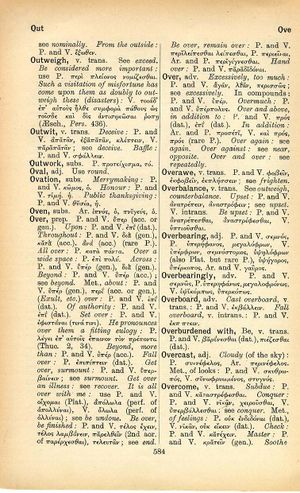outweigh: Difference between revisions
From LSJ
νεκρὸν ἐάν ποτ' ἴδηις καὶ μνήματα κωφὰ παράγηις κοινὸν ἔσοπτρον ὁρᾶις· ὁ θανὼν οὕτως προσεδόκα → whenever you see a body dead, or pass by silent tombs, you look into the mirror of all men's destiny: the dead man expected nothing else | if you ever see a corpse or walk by quiet graves, that's when you look into the mirror we all share: the dead expected this
m (Text replacement - "<b class="b2">Pers.</b>" to "''Pers.''") |
m (Woodhouse1 replacement) |
||
| Line 1: | Line 1: | ||
{{Woodhouse1 | {{Woodhouse1 | ||
|Text=[[File:woodhouse_584.jpg|thumb|link={{filepath:woodhouse_584.jpg}}]] | |Text=[[File:woodhouse_584.jpg|thumb|link={{filepath:woodhouse_584.jpg}}]] | ||
===verb transitive=== | |||
See [[exceed]]. | See [[exceed]]. | ||
[[be considered more important]]: use [[prose|P.]] [[περὶ πλείονος νομίζεσθαι]]. | |||
[[such a visitation of misfortune has come upon them as doubly to outweigh these]] ([[disasters]]): [[verse|V.]] [[τοιάδ' ἐπ' αὐτοὺς ἦλθε συμφορὰ πάθους]] [[ὡς τοῖσδε καὶ δὶς ἀντισηκῶσαι ῥοπῇ]] ([[Aeschylus|Aesch.]], ''[[Persae]]'' 436). | |||
}} | }} | ||
Revision as of 08:54, 20 May 2020
English > Greek (Woodhouse)
verb transitive
See exceed.
be considered more important: use P. περὶ πλείονος νομίζεσθαι.
such a visitation of misfortune has come upon them as doubly to outweigh these (disasters): V. τοιάδ' ἐπ' αὐτοὺς ἦλθε συμφορὰ πάθους ὡς τοῖσδε καὶ δὶς ἀντισηκῶσαι ῥοπῇ (Aesch., Persae 436).

